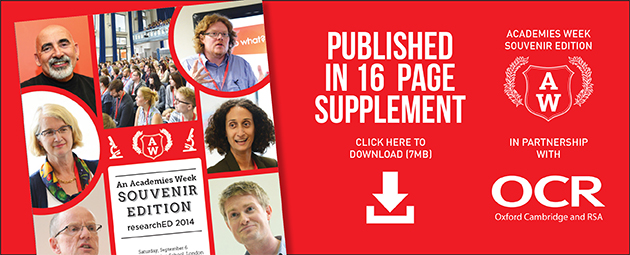Educationist Martin Robinson emphasised the importance of a balance between tradition and innovation.
Speaking at Saturday’s conference, Mr Robinson (pictured) gave the audience tales of how research could improve thinking, but should also be treated with caution.
He said: “What’s the relationship between undermining authority and research? For me, it’s about tradition. And research belongs to the sort of dialectical world, so in trivium [grammar, dialectic, and rhetoric] terms, one undermines the other.
“Look at Twitter, how much of that is about using research to undermine things? It’s about saying ‘well this is actually true’ and ‘your school shouldn’t be doing that’.
“What kind of relationship should there be between a rational thinking practitioner and a rational thinking researcher, and the irrational tradition of our institutions, the system and the power of vested interest? Schools exist as part of the establishment, they are an established institution,” he said.
“Now, if we question the tradition that the school has, what happens to that institution if you start questioning it, and questioning it, and questioning it? If you tell your teachers to look out for research. and they come in . . . and they say ‘well this research actually shows everything that we have stood for is wrong’, what happens to the institution?
By worrying about small targets, backed up by evidence, you lose the picture of the whole.
“What happens to that teacher? Do you embrace them and say ‘great teacher, well done for finding that out and by the way we have thought of a great place for you to go to do some research for us – it’s called the Outer Hebrides – and we would like you to visit there for some time to perhaps to look at whether to set up a school there’. Do you silence the possibility of someone coming up with something that can undermine the institution?”
Mr Robinson, the author of Trivium 21c and an experienced teacher, explained how scientific research into such things as diet was constantly adapting, and how the “perfect weight” could mean different things – but the sensible outcome to being healthy was to adapt a common sense approach.
He said: “Everything is part of something larger. By worrying about small targets, backed up by evidence, you lose the picture of the whole. You can’t see the wood because you are obsessing about one tree.
“So, the dilemma in your school – do you want backward, docile teachers accepting dictats of management or rational-minded teachers accepting the universality of reason but likely to become prevaricating upstarts ready to undermine their leaders? If you want a rational profession, a school, which is quite an irrational place, might start to quake somewhat. Think about it. What is rational about a school?
“A school is not a rational place, it hangs together on ‘these are the way things are done’ and if you question it too much you might destroy the very thing that enables it to work. What enables it to work is tradition.
“And any school that has moved, via headlines, and changed its way of working over time, whether it has gone down the ‘Brain Gym’ route or the ‘multiple intelligence’ route it is likely to be as confusing to someone who is trying to do their weight by the BMI . . . it might be measuring the wrong things, it might be reactive to anything trying to get things right.
“The pursuit of reason might actually destroy the strength of the school. That doesn’t mean you shouldn’t have reason. But the reason should be part of the conversation of the school. It shouldn’t be the only thing the school follows.
“So, one of the things you need to know is reason and the forces of reason are a journey towards truth. They are not truth itself. And the same with tradition, and the same with all the unmeasurable things.”








Your thoughts